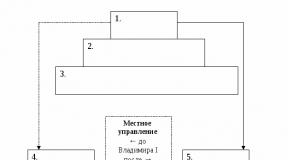Tax audit types and methods. Stages of tax audit. What is a tax audit - in simple language about complex things
Tax audit- this is one of the most popular types audit services. A tax audit is an assessment of the client’s company’s existing tax model, as well as the development of a conclusion on the possibility of increasing efficiency in the environment tax accounting companies.
By tax audit we mean a special audit task to review the procedure for the formation of the client’s accounting and tax reports in order to express an opinion on the degree of reliability and compliance with the standards established by law, the procedure for the formation, recording and payment by the client’s enterprise of taxes and other payments to budgets of different levels, as well as to extra-budgetary funds.
Tax audit as a separate type of audit is not distinguished by Law N 119-FZ, but rather refers to related services and is therefore proactive. In fact, a tax audit can be part of a general audit if the customer of the general audit wishes to audit the tax accounting and tax reporting of his organization. However, the tax component of the general audit cannot cover the entire volume of information affecting the tax obligations of the organization. Therefore, in order to study as fully as possible and subsequently reduce the tax risks of an organization, it is necessary to conduct a full tax audit.
Many organizations for which general audit is mandatory indicate in contracts with audit firms the scope of tax audit work. Verification of tax reporting and tax accounting, unlike a general audit, should be carried out using a continuous method, and since the volume of tax information is significantly less than the volume of all financial information of the organization, then this verification method is quite applicable for a tax audit.
The purpose of the tax audit is:
- preparing the organization for any possible audit by tax authorities
- general analysis of the taxation system of an economic entity;
- identification of the main factors influencing tax indicators;
- checking the methodology for calculating tax payments;
- preliminary calculation of tax indicators of an economic entity.
- confirmation of the correctness of calculation and payment by an economic entity of taxes and fees to the budget and extra-budgetary funds
- minimizing tax payments
Tax audit clients
In order to minimize tax payments, as well as avoid penalties, it is advisable and economically profitable for companies to conduct a tax audit, through which it will be possible to identify and neutralize errors in tax accounting and preparation of tax reporting. Organizations for which a general audit is mandatory can also order a tax audit separately. Such organizations include: open joint stock companies; credit, insurance organizations, commodity and stock exchanges, investment funds, state extra-budgetary funds, the source of funds of which are those provided for by law Russian Federation mandatory contributions made by individuals and legal entities, as well as funds, sources of funds, which are voluntary contributions of individuals and legal entities; organizations and individual entrepreneurs, the volume of revenue from the sale of products in one year exceeds 500 thousand minimum wages or the amount of balance sheet assets, which at the end of the reporting year exceeds 200 thousand minimum wages; other organizations in respect of which mandatory audit provided for by federal law.
In fact, a tax audit is similar in method to the audit carried out by the tax authorities. Therefore, if a tax audit is carried out in an organization before a tax audit, the risks of identifying errors and, as a result, accruing penalties and bringing tax liability are significantly reduced.
The next category of business entities that require a tax audit are organizations in which the chief accountant has changed. For objective reasons, this has a very negative impact on the quality of accounting and tax accounting in the organization. It is very difficult for the chief accountant, who sometimes single-handedly deals with all issues related to taxation, to organize correct tax accounting in a new company and correct existing mistakes of his predecessor. He needs help in the form of a tax audit. A tax audit of an organization can also be ordered by the owner or manager of the organization in order to verify the correctness of calculation and payment of taxes.
Tax audit methodology
Almost every audit firm has its own methods and methods of conducting an audit. It is impossible to create a universal tax audit methodology, since, despite the unity of the tax system in our country, each business entity has its own characteristics in the calculation and payment of taxes. Tax audit as a process consists of several stages:
- preliminary assessment (examination) of the existing taxation system of an economic entity;
- verification and confirmation (non-confirmation) of the correctness of calculation and payment by an economic entity of taxes and fees to the budget and extra-budgetary funds;
- registration and presentation of tax audit results.
At each of these stages, auditors perform certain verification actions.
So, at the first stage you need to:
- conduct a general analysis of the elements of the taxation system of an economic entity; identify the main factors influencing tax indicators;
- check the correctness of the methodology for calculating tax payments;
- conduct a legal and tax examination of the existing system of economic relations;
- analyze the organization of document flow and study the functions and powers of the services responsible for the calculation and payment of taxes;
- carry out a preliminary calculation of tax indicators of an economic entity.
Carrying out procedures at this stage allows us to consider such significant factors as the specifics of the main business transactions economic entity and existing objects of taxation, compliance of the taxation procedure applied by the organization with the norms of current legislation, assess the level of tax obligations and potential tax violations.
At the next, main stage of the audit, it is necessary to determine which areas of tax accounting require an in-depth audit. Based on the results of the preliminary analysis, auditors can identify problematic issues in the organization’s tax system, so it is not advisable to conduct a full audit of all areas of the tax system. For example, at the first stage it is quite possible to understand that the organization will most likely have problems with export VAT, since the organization sells goods (work, services) abroad, with income tax, since accounting for income and expenses for tax purposes is not organized properly, with excise taxes, if the organization sells excisable products, etc. On the other hand, you can immediately identify areas where problems are most likely not to arise. This applies primarily to simple taxes (advertising tax, transport tax etc.).
However, in organizations with a complex and voluminous system of tax obligations, having separate divisions, subsidiaries, applying different taxation regimes (general regime for the parent organization and a single tax on imputed income for separate division), the second stage of the tax audit should be carried out using a continuous method. During the second stage of work, tax reporting submitted by the economic entity in established forms is checked, the correctness of tax calculations, payment deadlines, etc. At the same time, the methods and methods of checking each tax have their own characteristics.
During the inspection (audit), auditors must interact closely with the accounting and legal services of the organization, as well as directly with management. First of all, auditors must understand what and how the audited organization actually does. The auditor should not ignore all problematic and risky (from a tax point of view) transactions of the audited organization, therefore the management of the organization and the accounting service must provide the auditor not only with formal information about their activities, but also with actual information.
The need for close interaction between the auditing and audited parties during a tax audit is also due to the fact that during the audit, the organization’s accounting department must strive to immediately correct the maximum possible number of errors detected by the auditors. Thus, the purpose of a tax audit is not to detect as many errors as possible and enter them into the report, but to correct the detected errors together with the organization’s employees. If some errors can no longer be corrected for one reason or another, auditors include them in their report with recommendations on how to avoid similar errors in the future.
At the third, final stage, the results of the audit are summarized. results audit are formalized by the auditor's report. In conclusion on the results of a special audit assignment to conduct a tax audit, an opinion should be expressed: on the degree of completeness and correctness of the calculation, reflection and transfer of payments by an economic entity to the budget and extra-budgetary funds; on the correctness of application of tax benefits by an economic entity.
However, the conclusion itself does not provide analytical or recommendatory information. Therefore, the audit client should also require an audit report, which details all identified errors and makes recommendations for correcting them. The auditing organization is responsible for the correctness and completeness of the reflection of data in the conclusion and (or) report of the auditor on the distortions identified by him.
Those. When conducting a tax audit, the following issues are considered:
- Assessing the correctness of determining the tax base;
- Assessing the legality of applying tax benefits;
- Assessing the correctness of the calculation of tax liabilities, including:
- value added tax,
- excise taxes
- corporate income tax,
- income tax individuals,
- unified social tax,
- customs duties and fees,
- corporate property tax,
- transport tax,
- land tax,
- taxes paid in connection with the application of special tax regimes,
- etc.
- Assessing the correctness of settlements with extra-budgetary funds, including:
- Pension Fund RF,
- Social Insurance Fund of the Russian Federation,
- Foundation health insurance RF,
- Employment Fund of the Russian Federation (on job quotas).
- Examination of acts of tax authorities relating to taxation issues.
- Tax planning and tax optimization.
- Protecting the interests of the taxpayer in arbitration courts and courts of general jurisdiction.
- Representation of the interests of an economic entity in tax and other executive authorities.
- Development and presentation:
- recommendations and proposals for improving the existing tax system of an economic entity;
- optimal mechanisms for calculating taxes, taking into account the characteristics of an economic entity;
- recommendations on complete and correct use economic entity tax benefits;
- proposals for the creation of a specific set of measures aimed, within the framework of current legislation, at minimizing taxes paid and reducing tax risks;
- preliminary calculation of tax payments for various options contractual relations of an economic entity and types of activities;
- recommendations for achieving compliance with tax accounting principles applied by individual divisions and branches, unified system tax planning applicable to an economic entity;
- recommendations and proposals for creating a system of internal control of an economic entity over the correct calculation of taxes and fees;
- proposals for adapting the current system of tax planning and accounting to possible changes in tax legislation requirements.
Based on the results of the tax audit, a conclusion is drawn up on the results of the special audit assignment, which contains substantiated conclusions and proposals, namely:
- conclusions about the state of tax accounting;
- conclusion on the adequacy of the taxation system for the company’s activities;
- information about potential tax risks;
- Possibility of planning the company's tax burden.
As a result of a tax audit, an economic entity receives:
- Assessing the correctness of determining the tax base.
- Assessing the legality of applying tax benefits.
- Assessing the correctness of the calculation of tax liabilities.
- Calculation of tax consequences for an economic entity in cases of incorrect application of tax legislation.
- Recommendations and proposals for improving the existing tax system of an economic entity;
- Optimal mechanisms for calculating taxes, taking into account the characteristics of an economic entity;
- Recommendations on the full and correct use of tax benefits by an economic entity.
Auditors' responsibilities
It is obvious that auditors, like tax officials, are able to identify possible violations of current legislation. However, the goal of the tax authorities is to hold the business entity accountable, and the goal of the auditors is to reduce the likelihood of the organization being held accountable. Auditors cannot force their client to make certain decisions; they can only give informed recommendations. Thus, in the event of detection of violations of tax legislation and distortions in the accounting and tax reporting of an economic entity that are of a significant nature, the audit organization must inform the management of the economic entity about responsibility for the violations and the need to make changes to the accounting statements, clarify tax returns and calculations.
If the accounting department of the organization does not consider it necessary to correct significant violations identified by the audit organization based on the results of a special audit assignment, the audit organization must send a letter of notification to the head of the organization about this fact and inform about liability for violation of current legislation. The decision whether or not to follow the recommendations of the audit firm remains with the head of the organization. Thus, the audit firm relieves itself of liability both to the law and to the client in the event that the latter is held accountable. However, the audit firm has certain obligations to the client. In particular, she is responsible for failure to maintain the confidentiality of commercial information of the audited organization. Upon completion of the tax audit, the customer can use other services of the audit firm.
An audit organization can also represent the interests of a business entity in relations with tax authorities. Communication with tax authorities during and following the results of a tax audit is carried out: to obtain clarifications on audit reports carried out by tax authorities in relation to the economic entity being audited; when providing consultations (legal, accounting, tax, etc.) to an economic entity in disputes with tax authorities; in other necessary cases.
The result of providing related services on tax issues may be: indications of the presence of tax offenses and tax consequences for an economic entity in cases of detection of violations of tax legislation; practical recommendations for eliminating negative consequences related to established violations of tax legislation; development of new projects for constructing both a general system of taxation of an economic entity and its individual elements; making recommendations for adapting accounting elements and registers (including when using computer data processing) to the chosen concept of tax management, the developed set of tax projects, changes in tax legislation and other factors that have a significant impact on the level of completeness, accuracy and timeliness of calculation and transfers of payments to the budget and extra-budgetary funds; development of a set of organizational, legal and operational management measures aimed at creating a permanent tax planning system.
However, it should be borne in mind that a positive result from the provision of services related to a tax audit can only be achieved when these services were preceded by a tax audit as such. Otherwise, auditors will not be able to operate with the entire volume of information about the organization and its activities, and therefore find an effective solution to the problem.
Our company operates successfully in the market audit services for more than 10 years, and therefore our specialists in audit have extensive experience and knowledge in matters audit of organizations (enterprises) by type of activity , audit of individual transactions , mandatory audit , proactive audit , tax audit , financial audit , consolidation of statements (including IFRS).
Our accountants and auditors ready to answer any questions from legal entities and individual entrepreneurs regarding audit.
Tax audit is one of the most popular types of audit services. A tax audit is an assessment of the client’s company’s existing tax model, as well as the development of a conclusion on the possibility of increasing efficiency in the company’s tax accounting environment.
By tax audit we mean a special audit task to review the procedure for the formation of the client’s accounting and tax reports in order to express an opinion on the degree of reliability and compliance with the standards established by law, the procedure for the formation, recording and payment by the client’s enterprise of taxes and other payments to budgets of different levels, as well as to extra-budgetary funds.
Tax audit as a separate type of audit is not distinguished by Law N 119-FZ, but rather refers to related services and is therefore proactive. In fact, a tax audit can be part of a general audit if the customer of the general audit wishes to audit the tax accounting and tax reporting of his organization. However, the tax component of the general audit cannot cover the entire volume of information affecting the tax obligations of the organization. Therefore, in order to study as fully as possible and subsequently reduce the tax risks of an organization, it is necessary to conduct a full tax audit.
Many organizations for which general audit is mandatory indicate in contracts with audit firms the scope of tax audit work. Verification of tax reporting and tax accounting, unlike a general audit, should be carried out using a continuous method, and since the volume of tax information is significantly less than the volume of all financial information of the organization, then this verification method is quite applicable for a tax audit.
The purpose of the tax audit is:
· preparing the organization for any possible audit by tax authorities
· general analysis of the taxation system of an economic entity;
· identification of the main factors influencing tax indicators;
· checking the methodology for calculating tax payments;
· preliminary calculation of tax indicators of an economic entity.
· confirmation of the correctness of calculation and payment by an economic entity of taxes and fees to the budget and extra-budgetary funds
· minimization of tax payments
Tax audit clients
In order to minimize tax payments, as well as avoid penalties, it is advisable and economically profitable for companies to conduct a tax audit, through which it will be possible to identify and neutralize errors in tax accounting and preparation of tax reporting. Organizations for which a general audit is mandatory can also order a tax audit separately. Such organizations include: open joint-stock companies; credit, insurance organizations, commodity and stock exchanges, investment funds, state extra-budgetary funds, the source of funds of which are mandatory deductions provided for by the legislation of the Russian Federation, made by individuals and legal entities, as well as funds, the sources of education of which are voluntary contributions of individuals and legal entities persons; organizations and individual entrepreneurs, the volume of revenue from the sale of products in one year exceeds 500 thousand minimum wages or the amount of balance sheet assets, which at the end of the reporting year exceeds 200 thousand minimum wages; other organizations in respect of which mandatory audit is provided for by federal law.
In fact, a tax audit is similar in method to the audit carried out by the tax authorities. Therefore, if a tax audit is carried out in an organization before a tax audit, the risks of identifying errors and, as a result, accruing penalties and bringing tax liability are significantly reduced.
The next category of business entities that require a tax audit are organizations in which the chief accountant has changed. For objective reasons, this has a very negative impact on the quality of accounting and tax accounting in the organization. It is very difficult for the chief accountant, who sometimes single-handedly deals with all issues related to taxation, to organize correct tax accounting in a new company and correct existing mistakes of his predecessor. He needs help in the form of a tax audit. A tax audit of an organization can also be ordered by the owner or manager of the organization in order to verify the correctness of calculation and payment of taxes.
Tax audit methodology
Almost every audit firm has its own methods and methods of conducting an audit. It is impossible to create a universal tax audit methodology, since, despite the unity of the tax system in our country, each business entity has its own characteristics in the calculation and payment of taxes. Tax audit as a process consists of several stages:
· preliminary assessment (examination) of the existing taxation system of an economic entity;
· verification and confirmation (non-confirmation) of the correctness of calculation and payment by an economic entity of taxes and fees to the budget and extra-budgetary funds;
· registration and presentation of tax audit results.
At each of these stages, auditors perform certain verification actions.
So, at the first stage you need to:
· conduct a general analysis of the elements of the taxation system of an economic entity; identify the main factors influencing tax indicators;
· check the correctness of the methodology for calculating tax payments;
· conduct a legal and tax examination of the existing system of economic relations;
· analyze the organization of document flow and study the functions and powers of the services responsible for the calculation and payment of taxes;
· carry out a preliminary calculation of tax indicators of an economic entity.
Carrying out procedures at this stage allows us to consider such significant factors as the specifics of the main business operations of an economic entity and existing objects of taxation, compliance of the taxation procedure applied by the organization with the norms of current legislation, and assess the level of tax obligations and potential tax violations.
At the next, main stage of the audit, it is necessary to determine which areas of tax accounting require an in-depth audit. Based on the results of the preliminary analysis, auditors can identify problematic issues in the organization’s tax system, so it is not advisable to conduct a full audit of all areas of the tax system. For example, at the first stage it is quite possible to understand that the organization will most likely have problems with export VAT, since the organization sells goods (work, services) abroad, with income tax, since accounting for income and expenses for tax purposes is not organized properly, with excise taxes, if the organization sells excisable products, etc. On the other hand, you can immediately identify areas where problems are most likely not to arise. This applies primarily to simple taxes (advertising tax, transport tax, etc.).
However, in organizations with a complex and voluminous system of tax obligations, having separate divisions, subsidiaries, applying different taxation regimes (general regime for the parent organization and a single tax on imputed income for a separate division), the second stage of the tax audit should be carried out using a continuous method. During the second stage of work, tax reporting submitted by the economic entity in established forms is checked, the correctness of tax calculations, payment deadlines, etc. At the same time, the methods and methods of checking each tax have their own characteristics.
During the inspection (audit), auditors must interact closely with the accounting and legal services of the organization, as well as directly with management. First of all, auditors must understand what and how the audited organization actually does. The auditor should not ignore all problematic and risky (from a tax point of view) transactions of the audited organization, therefore the management of the organization and the accounting service must provide the auditor not only with formal information about their activities, but also with actual information.
The need for close interaction between the auditing and audited parties during a tax audit is also due to the fact that during the audit, the organization’s accounting department must strive to immediately correct the maximum possible number of errors detected by the auditors. Thus, the purpose of a tax audit is not to detect as many errors as possible and enter them into the report, but to correct the detected errors together with the organization’s employees. If some errors can no longer be corrected for one reason or another, auditors include them in their report with recommendations on how to avoid similar errors in the future.
At the third, final stage, the results of the audit are summarized. The results of the audit are documented in an audit report. In conclusion on the results of a special audit assignment to conduct a tax audit, an opinion should be expressed: on the degree of completeness and correctness of the calculation, reflection and transfer of payments by an economic entity to the budget and extra-budgetary funds; on the correctness of application of tax benefits by an economic entity.
However, the conclusion itself does not provide analytical or recommendatory information. Therefore, the audit client should also require an audit report, which details all identified errors and makes recommendations for correcting them. The auditing organization is responsible for the correctness and completeness of the reflection of data in the conclusion and (or) report of the auditor on the distortions identified by him.
Those. When conducting a tax audit, the following issues are considered:
· Assessing the correctness of determining the tax base;
· Assessing the legality of applying tax benefits;
· Assessing the correctness of the calculation of tax liabilities, including:
§ value added tax,
§ excise taxes,
§ corporate income tax,
§ personal income tax,
§ unified social tax,
§ customs duties and fees,
§ corporate property tax,
§ transport tax,
§ land tax,
§ taxes paid in connection with the application of special tax regimes,
Despite the fact that the legislation does not require, as part of verifying the reliability of financial statements of organizations, mandatory separate tax audit, this type of audit is becoming increasingly relevant. This is mainly due to the high risks of additional charges to the budget during audits by tax authorities. Let's consider the features of a tax audit.
Audit of accruals and more
Even for those companies that are required to provide an opinion on the reliability of their financial statements, this type of tax reporting opinion is not necessary. However, tax risks are becoming more likely and tangible.
Therefore, carrying out a tax audit (both as part of a mandatory audit and separately) is necessary primarily for companies that carry out high-risk operations in terms of additional tax assessments. For example, export-import, preferential, not having an unambiguous interpretation in tax legislation, etc.
Verification by auditors of the correctness of calculation of tax liabilities is also necessary for those organizations that operate under conditions of combining tax regimes.
A tax audit can reveal not only those facts that led to potential arrears to the budget, but also those that formed hidden tax reserves in the form of overpayments. This can happen when a company, having the right to a benefit, does not take advantage of it. For example, it did not apply the property tax incentive for highly energy efficient properties or the incentives provided by regional legislation.
Goals and stages of an enterprise tax audit
As a result of the audit, auditors must draw a conclusion about how reliable the tax reporting of the enterprise is, what errors were identified and what measures should be taken to eliminate them.
To achieve this goal, 3 main stages can be distinguished:
- studying the state of tax accounting of the audited enterprise for a year or other period;
- assessment of the state of tax accounting;
- development of recommendations to minimize tax risks.
Tax audit tasks
During the implementation of these stages, inspectors will perform the following main tasks:
- checking the completeness of the tax base for all taxes paid by the enterprise. In this case, objects that are not included in the property tax base may be identified, for example, movable property received from related parties, or transactions that are not included in the VAT calculation base, such as gratuitous transfer of property, etc.;
- checking the tax base for the inclusion of non-taxable transactions. For example, it is possible for an enterprise to erroneously include in income tax income property received to replenish net assets, etc.;
- checking the validity of using reduced or zero tax rates. When performing this task, auditors can identify the illegality of agricultural or medical organizations using a 0% rate on income tax or the use of such a rate when receiving income outside the scope of their core activities (rental income, sales of fixed assets, interest on loans, etc.). Also, when performing this task, the validity of applying a 0% VAT rate on export transactions, etc. is checked;
- validity and possibility of applying tax benefits. Here it is necessary to carry out a check taking into account the provisions of not only federal, but also regional legislation;
- assessment of the riskiness of tax accounting policies. As part of this task, auditors will check how often the organization's approach to solving a particular tax problem differs from the point of view of controllers or senior arbiters. Here the applied methods of tax optimization will be reviewed and assessed;
- checking the correctness of tax reporting taking into account all identified facts and providing recommendations for its clarification;
- development of recommendations for the use of discovered tax reserves.
Please note that it is possible to audit the correctness of calculation of a separate tax, and not all taxes paid by the enterprise as a whole.
Tax audit risks will win!
What is a tax audit?
Tax audit is a check of the correctness of calculation and payment of taxes, incl. control of filling out tax returns and calculations.
The main goal of a tax audit is to eliminate tax risks and minimize financial losses of the company, owners and managers. Indeed, in the case of additional tax assessment, the company faces a fine of 20% of the amount of additional assessments and penalties, and if there is evidence of intent to evade taxes, the fine will be 40%. Moreover, the manager, owner or other controlling person may face criminal, subsidiary and property liability. By the way, in the second half of 2018, the number of cases involving subsidiary liability increased by 2 times.
Why is tax audit especially important recently?
IN Lately The effectiveness of on-site tax audits exceeded 98%, i.e. tax authorities come out for inspection only in cases where there is a reason for this (they use a risk-based approach).
The minimum amount of additional assessments for on-site tax audits in Moscow is 16.5 million rubles, and in the regions - 5 million rubles. Therefore, a tax audit can save at least 1 million rubles. (minimum additional charge of 5 million rubles * 20%).
Already at the stage of desk audits of tax returns, inspectors can get an idea of the taxpayer and even determine the estimated amount of non-payment of taxes. Now the program of the Federal Tax Service of the Russian Federation analyzes chains of counterparties, the presence of unreliable taxpayers in them, identifies inconsistencies in declaration indicators, for example, between the tax base for VAT and income tax, evaluates the tax burden, profitability and other indicators of companies.
Therefore, if the taxpayer’s reporting does not raise any complaints from the tax authority, there is no reason to order an on-site tax audit. In addition, with impeccable tax reporting, the number of requests from the tax office during desk audits is reduced, which cannot but affect the work of the accounting department and the emotional mood of employees. Confidence in tax return data means peace of mind for the manager and owner.
In order for an organization to have such confidence or at least a real idea of the state of tax accounting and reporting and the tax risks of the company, a tax audit should be conducted.
In addition, a tax audit is carried out at the initiative of the owners or managers of the company to check the competence of the accounting staff responsible for calculating taxes. After all, sometimes taxes are overpaid, incl. and in cases where tax planning is not organized correctly, such as in this case.
What are the features of a tax audit (its individual types)?
At the Customer’s request, a tax accounting audit can be carried out for a certain period (quarter, year, several years, etc.) and in relation to all or some taxes:
1. Income tax audit
Such verification is necessary for any company using common system taxation. As practice shows, not all taxpayers pay due attention to documenting expenses. Sometimes due to the lack of internal documents (for example, a report on a promotional campaign, an act for the release of materials into production, technological map etc.) the taxpayer risks “losing” tax expenses.
An income tax audit is especially necessary for companies working with foreign partners, incl. attracting foreign funding (during an income tax audit, the fulfillment of the duties of a tax agent and the legality of his application of tax rates are checked).
Victoria Varlamova
2. VAT audit
Tax authorities pay special attention to VAT (ASK-VAT3), therefore for taxpayers this is the most “risk-containing” tax. As part of the VAT audit, counterparties are checked for “reliability”, the correctness and timeliness of determining the tax base, the application of VAT exemption and preferential rates (10%, 0%), the procedure for maintaining separate VAT accounting, etc.
3. Audit of corporate property tax
An audit is necessary for organizations that own real estate. In practice, there were cases when the accountant underestimated the tax because she calculated it based on the average annual value of the property, and not on the cadastral value. Or, conversely, organizations overpaid the tax by mistakenly calculating tax on real estate that was not subject to taxation, as, for example, in this case.
4. Personal income tax and insurance premiums
These “salary taxes” are paid by all organizations and are under special control by the tax authorities, incl. employers are summoned to “salary commissions,” and criminal liability was introduced several years ago for non-payment of insurance premiums.
First of all, an audit of personal income tax and insurance premiums is necessary for companies producing various social payments employees, as well as those with foreign employees.
5. Other taxes and fees
When conducting a tax audit, other taxes and fees are also analyzed: tax under the simplified tax system, transport tax, payments for negative impact on environment, payment state duties, regional and local taxes and disputes, such as trade and resort taxes, etc.
How is a tax audit of an organization carried out?
First of all, auditors get acquainted with the types of activities of the Client. The parties determine the period and issues for conducting a tax audit. They agree on the composition of experts, verification methods, and cost of services. Before starting work, a Confidentiality Agreement is concluded.
Some Clients have heard that from January 1, 2019, tax authorities will have the right to request documents (information) from auditors about the activities of their Clients (Article 93.2 of the Tax Code of the Russian Federation introduced by Federal Law No. 231-FZ of July 29, 2018, effective January 1, 2019) and are afraid that information about errors identified during a tax audit will become available to the tax inspectorate. We hasten to reassure you that an audit company should provide documents to the tax authorities only if the taxpayer himself does not provide them, and only if the required documents are available to the auditors.
Victoria Varlamova
Tax Service Advisor, rank II, deputy. hands consulting department, ch. tax expert
- Based on the results of the tax audit, the Client receives a Conclusion. It contains:
Tax audit. As a rule, the inspection is carried out on the territory of the customer company. The duration of the audit depends on the scope of the issues being investigated. A comprehensive tax audit of tax returns for the year usually takes one to two weeks.
- identified errors and possible tax risks, their numerical indicators, possible amounts of fines and penalties, recommendations for correcting errors and minimizing risks
- identified financial reserves (if any)
- The results of the tax audit are discussed with the Client (feedback) in order to clarify all controversial issues and answer clarifying questions to correct errors.
Who is interested in a tax audit?
Manager and owner - they need to know about tax risks and evaluate possible consequences for yourself, and also be confident in the qualifications of the accounting staff, incl. that they calculate taxes correctly and do not overpay.
Chief accountant and financial director. A tax audit is an opportunity to check yourself and the accounting staff (only those who do nothing make mistakes) and share responsibility with the auditors (if the tax authorities discover errors that the auditors missed, it is not the accountant’s fault, because he was checked...). Also quite often, auditors help the chief accountant (financial director) convey information about the company’s risks to the manager.
How to choose a company to audit tax accounting in an organization?
You can only trust trusted companies with an impeccable reputation. Otherwise, the meaning of conducting a tax audit is lost.
A high-quality tax audit cannot be cheap.
We recommend that you familiarize yourself with the company’s website and study customer reviews about it and its employees. Look at their resumes, if possible, evaluate articles and other materials of the auditors of this company posted on the Internet. Check the audit company's membership in the SRO, read information about liability insurance, the presence of the company in various ratings, etc.
"Pravovest Audit" is an audit company that is included in the TOP-18 largest audit companies (according to Expert RA), a member of the SRO "Commonwealth", auditors and experts - only full-time employees with extensive work experience. We conduct more than 500 audits per year, incl. for organizations with foreign capital. Our professional liability is insured by INGOSSTRAKH. The company provides audit services: mandatory, comprehensive, tax, IFRS, as well as consulting services, etc.
Subjects of financial and economic activity, sooner or later, face a tax audit. And you need to be prepared for this event. To minimize the risk of fines and penalties for errors in tax accounting, the best thing you can do is order an independent audit.
A tax audit is a tax audit, only in this case the auditor is on your side and protects the interests of your company.
During the audit of reporting, attention is paid to the timely payment of taxes to the budget, the correct application of benefits is checked, the organization’s cost items are clarified, interaction with non-residents, and all the questions that the inspector will have during the audit are analyzed.
Conducting a tax audit
The range of services for auditing tax accounting of an organization includes the following activities:
- Checking compliance with tax laws. The specialist checks the correctness of filling out primary documents, compliance with current legislation, their correct reflection in registers, and checks the correctness of tax payments. The reporting audit is carried out using a continuous or selective method.
- Checking the validity of benefits. The auditor determines how legal the tax benefits are, checks the availability of supporting documents and the extent to which they comply with the law.
- Checking declarations. This stage involves reconciliation of data from registers and declarations, deadlines for submitting reports to the tax authorities and completeness of information.
- Tax burden assessment. The auditor assesses the size of the enterprise's tax burden and prepares recommendations for reducing it.
- Search for tax risks. The specialist assesses the organization’s risks and makes recommendations to reduce them.
- The last stage is the provision of the audit report.
The most important thing in an audit is to choose an experienced and competent auditor, on whom the result of the audit depends. Internal audit of taxes and fees allows you to identify errors and develop methods to eliminate them.
All types of tax audit from AVT Consulting
As our practice shows, the benefits of an audit are tens of times greater than the costs of this service. By ordering a tax audit of an enterprise from the law firm “AVT Consulting”, you will appreciate the following advantages:
- Extensive experience and extensive practice in auditing gives us the opportunity to keep abreast of all changes in legislation.
- Our lawyers are highly qualified and have extensive experience behind them.
- If your organization is planning an urgent tax audit, we will fulfill an urgent order so that you have time to prepare before it begins.
- We guarantee complete confidentiality.
- We set reasonable prices for tax flow management audits and other types of audits.
The price of a company tax audit depends on the number of counterparties, the volume of revenue and the client’s needs. To find out the exact cost and order a service, contact us in a convenient way. Our initial consultation is free!



















